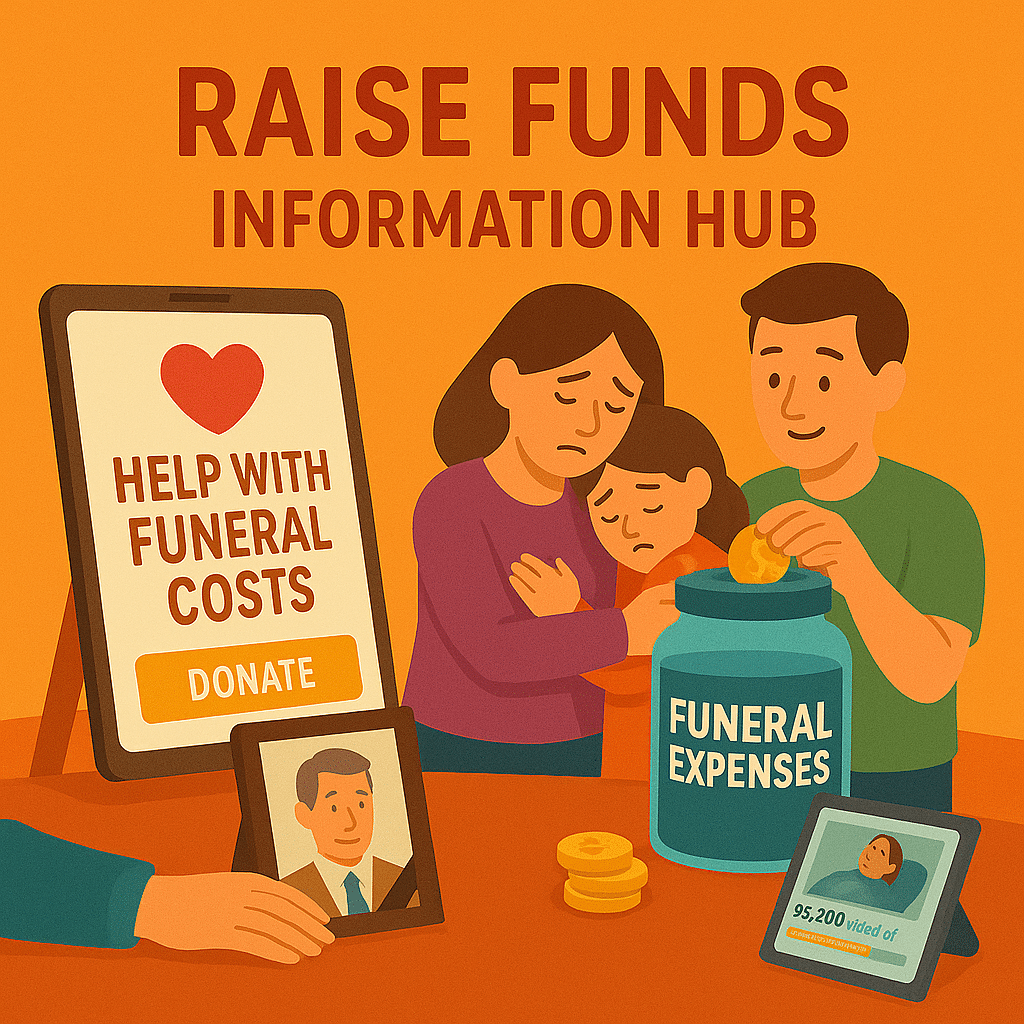Raise Funds Without Awkwardness
Raise Funds Information Hub
Asking for help is hard, especially when money is involved. Whether you’re facing funeral costs, medical bills, or the financial strain of caregiving, you shouldn’t have to go through it alone. This hub explains practical ways to pay for a funeral and raise funds for yourself or others during a time of need. It covers trusted fundraising platforms, helpful programs and services, and how to ask for support in a way that feels authentic and easy to say yes to.

Key Things To Know
When a loved one faces a crisis or passes away, the financial strain can feel overwhelming. Whether you're planning a fundraiser or looking into other types of support, having a clear plan can help ease the burden and make it easier for others to step in and help.
- Be clear about the need: Let people know exactly what the money or support will go toward. Common expenses include funeral costs, medical bills, travel, or time off work.
- Know your options: Fundraising platforms are one path, but there are also government programs, nonprofits, and local services that may be able to help. It’s worth exploring all of them.
- Tell a personal story: Whether you’re raising funds or applying for assistance, sharing the human side makes a difference. Let others understand who it’s for and why support matters.
- Set a realistic goal: For fundraisers, choose an amount that reflects actual needs. You can always adjust it later, but starting with a clear target helps people feel their gift will make a difference.
- Add visuals if possible: A photo or short video adds emotional connection. It makes your story more relatable and real.
- Keep people updated: If you’re running a fundraiser, let supporters know how things are going. Updates create trust and keep people engaged.
- Be open about who’s handling the money: If someone else is collecting funds on behalf of a family or friend, be transparent. It builds confidence and avoids confusion.
- Say thank you: Whether someone donates, shares your fundraiser, or helps you find assistance, a heartfelt thank you goes a long way.
Fundraising Platforms
The platforms below provide resources to create a clear, trustworthy fundraising page that makes it easy for others to contribute and share support.
Financial Assistance Grants & Programs
If a fundraiser won’t cover everything (or isn’t the right fit for your situation) there are other programs, services, and organizations that may be able to help with funeral costs.
Government Programs
Social Security: 1-800-772-1213 or www.ssa.gov
A one-time death benefit of $255 may be available to a surviving spouse or child.
Veterans Affairs: www.va.gov/burials-memorials
Veterans may qualify for up to $2,000 in burial benefits if the death was service-related. For non-service-related deaths, benefits typically range from $300 to $796, depending on whether the death occurred in a VA hospital.
FEMA Funeral Assistance: www.fema.gov
FEMA may reimburse funeral costs after federally declared disasters, including COVID-19-related deaths. Covered expenses can include transportation, burial or cremation, and related services.
State & County Burial Programs
Many counties offer basic cremation or burial services for families who cannot afford them. These programs may be called indigent burial, pauper’s funerals, or unclaimed remains programs. Contact your local public health office or coroner’s office for details.
Nonprofit & Religious Support
Children’s Burial Assistance: www.childrensburial.org
Provides donated caskets, urns, and other burial items to families who have lost a child.
The TEARS Foundation: www.thetearsfoundation.org
Offers funeral and emotional support to families grieving the loss of an infant or young child.
Final Farewell: www.finalfarewell.org
Helps families across the U.S. cover the burial costs of children.
Catholic Charities USA: www.catholiccharitiesusa.org
Local chapters may offer financial assistance or connect families with funeral help through affiliated programs.
Jewish Free Burial Association (JFBA): www.jfba.org
Offers free burials for Jewish individuals in financial need (primarily in the NYC area).
If the Death Was Situational
Crime Victim Compensation Funds: Search “crime victim compensation [your state]” for your state’s program.
If the death resulted from a homicide, most states offer compensation for funeral and burial expenses (often up to $10,000).
Native American & Alaska Native Assistance: Contact your tribe’s social services or www.bia.gov
The Bureau of Indian Affairs and tribal governments may provide burial aid to qualifying families.
University & Medical Body Donation: Search for “body donation program + [your state]"
Many universities offer free cremation and return of ashes when a body is donated for medical research.
Other Places to Check
-
Churches and Faith Communities: Some offer funeral assistance funds or will help promote a fundraiser to their congregation.
-
Unions and Trade Organizations: If the deceased was a member, there may be a death benefit.
-
Workplace or Employer Assistance: Some companies offer employee death benefits or will help coordinate life insurance.
-
Credit Unions: Many offer small accidental death or final expense payouts to members.
Frequently Asked Questions
Raising money for someone in need can feel personal, emotional, and a little intimidating. These FAQs can help you do it with clarity, compassion, and confidence.
Disclaimer: The information provided on this website and by Buried in Work is for general informational purposes only and should not be considered legal advice. Please consult with a qualified attorney or subject matter expert for advice specific to your situation.
